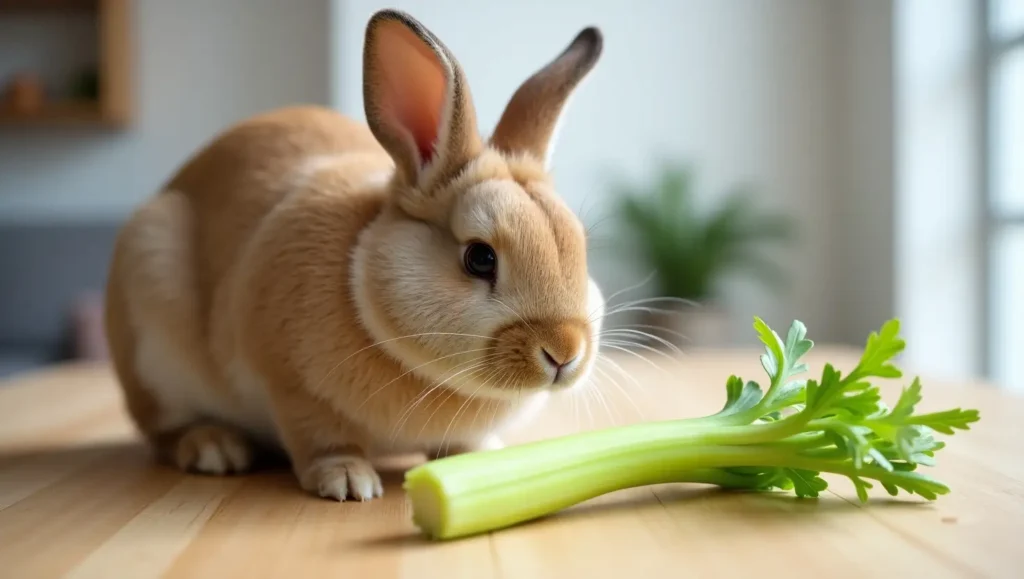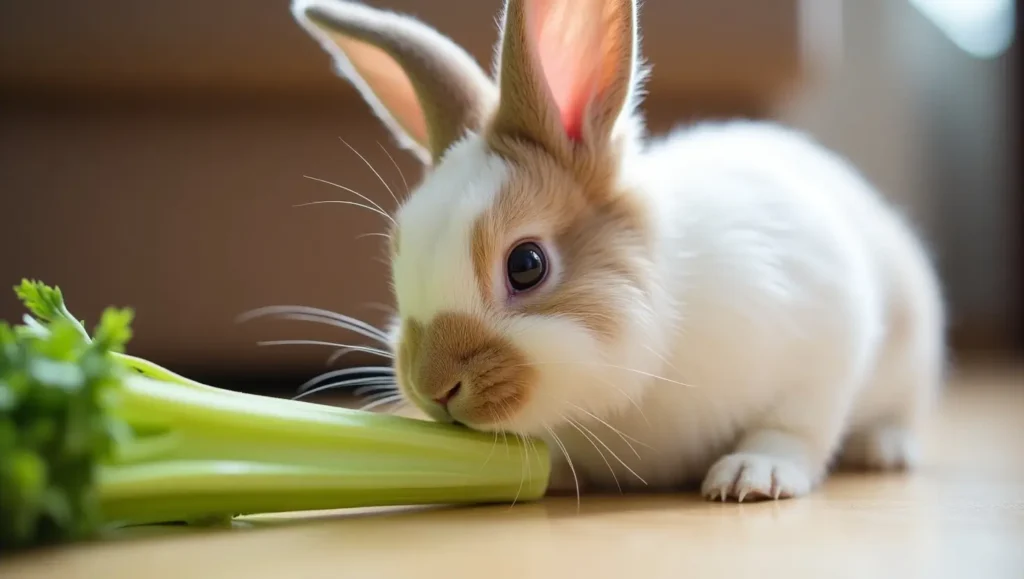If you’re a rabbit parent, chances are you’ve Googled the question: can rabbits eat celery? You’re not alone. At WhizPet, we noticed this query trending across forums, social media, and pet communities in the U.S. That’s why we decided to dig deep and uncover the truth—not just recycled information, but real, pet-focused research.
We analyzed vet-backed studies, surveyed rabbit owners, and even consulted small animal nutritionists to bring you the most up-to-date guide on can rabbits eat celery. Why? Because knowing what’s safe (and what’s not) can be the difference between a healthy bunny and an unexpected vet visit.
This blog doesn’t just give a simple yes or no. It’s packed with shocking facts, science-backed insights, and practical tips to help you feed celery the right way. Whether you’re raising a baby Netherland Dwarf or an energetic Mini Lop, this guide answers your biggest questions—starting with the one we’ve all asked: can rabbits eat celery, and should they?
Let’s hop right into it.
Understanding Rabbit Diets and the Role of Celery
Rabbits have a digestive system that thrives on fiber-rich diets, typically composed of hay, fresh leafy greens, and a measured amount of fresh vegetables. Their unique gastrointestinal tract demands consistency and high fiber content to maintain a healthy gut environment. This has led to widespread inquiry into various vegetables and their roles in a rabbit’s diet. Specifically, can rabbits eat celery safely and beneficially?
What Is Celery’s Nutritional Profile?
Celery is low in calories and high in water content, but it also offers vitamins A, C, and K, along with essential minerals like potassium and folate. These nutritional benefits can contribute positively to a rabbit’s overall health. However, the composition of celery also includes fibrous strings, which some rabbits may find harder to digest if not prepared properly. Considering these factors, the potential benefits must be weighed against how celery is introduced into their diet.
Expert Insight:
Veterinarians and animal nutritionists agree that while celery can be a healthy addition in moderation, it should never replace the bulk of a rabbit’s diet. Hay should remain the staple, providing the necessary fiber for their digestive tract, while vegetables like celery serve as a supplementary treat that adds nutritional variety.

Nutritional Benefits of Celery for Rabbits
For many U.S.-based rabbit owners, understanding the precise benefits of different vegetables is important, especially when it comes to introducing new food items into a pet rabbit’s diet. Here are some key nutritional insights:
- High Water Content: Celery helps maintain hydration, particularly in warmer months when rabbits require additional water intake.
- Rich in Vitamins: The high vitamin content—especially vitamin K and vitamin C—contributes to bone health and immune system support.
- Digestive Health: The natural fibers in celery support the digestive process, though moderation is key to avoid gastrointestinal distress.
Comparing Celery with Other Vegetables:
While many owners also ask, can rabbits eat carrots? or can rabbits eat cucumber?, celery stands out due to its low sugar content and high water percentage. Although carrots are often popular because of their sweetness, rabbits should only be given small amounts of them due to higher sugar levels. Similarly, cucumbers offer hydration but lack the fiber benefits celery provides. In short, every vegetable has its unique strengths, but celery’s contribution to daily water intake and vitamin supply makes it a valuable supplement.
How to Safely Incorporate Celery into Your Rabbit’s Diet
Introducing any new food to your rabbit requires a gradual approach and consistent observation. Here are actionable steps and best practices for incorporating celery:
Step-by-Step Guide:
- Start Small: Begin by offering a few small pieces of celery, ensuring that you separate the leaves, stalks, and even the tops, as different parts offer varied textures and nutritional content.
- Monitor Reaction: Over the next 24-48 hours, monitor your rabbit for any digestive issues. This is particularly important since some rabbits have sensitive systems. Ask yourself, how often can rabbits eat celery without any adverse effects?
- Mix with Other Greens: Blend celery with other rabbit-friendly greens such as basil, parsley, and cilantro. This helps balance their diet.
- Avoid Overfeeding: Even if the initial trial goes smoothly, maintain celery as an occasional treat rather than a daily staple. This is essential because high water content and fiber variation can cause digestive upset if consumed excessively.
- Winter Considerations: In colder months, ensure that can rabbits eat celery in the winter is practiced by adjusting portions—sometimes frozen or slightly warmed celery can be easier on your rabbit’s system.
Practical Example:
Imagine you recently introduced celery into your domestic rabbit’s diet. Over one week, you provide a small slice mixed in with their daily greens. You observe that their stool remains healthy, and their energy levels remain consistent. This gradual approach, incorporating celery stems and leaves, proves to be both safe and beneficial.
Addressing Common Concerns About Feeding Celery
In our research and consultation with various rabbit experts, several common questions arise among pet owners:
Can Celery Kill Rabbits?
A frequent concern is whether celery could be harmful or even toxic—can celery kill rabbits? Based on current research and expert opinion, celery is not known to be toxic to rabbits. However, improper preparation or overconsumption can lead to digestive complications. Always ensure that any vegetable, including celery, is introduced slowly and in moderation.
Which Parts of Celery Are Safe for Rabbits?
Rabbits can safely consume various parts of the celery plant:
- Celery Leaves: Rich in vitamins and antioxidants, though they should be given in moderation.
- Celery Stalks: Provide dietary fiber essential for digestion.
- Celery Tops/Greens: Contain additional nutrients but may be tougher, so chopping them finely is advisable.
- Celery Root: Not typically recommended because of its harder texture and potential for higher starch content.
Some rabbit owners often search for can rabbits eat celery leaves or can rabbits eat celery stalks to understand the best options. The consensus is that all parts can be given, but preparation is key.
Special Cases:
- Baby Rabbits: When considering what age can rabbits eat celery, it is generally advised that young, developing rabbits be introduced only to small amounts of new foods after establishing a stable hay-based diet.
- Special Breeds: Queries like can lionhead rabbits eat celery, can dwarf rabbits eat celery, and can netherland dwarf rabbits eat celery highlight that while breed differences exist, the overall dietary recommendations remain consistent across types.
- Wild vs. Domestic: There are also discussions around can wild rabbits eat celery versus can pet rabbits eat celery. Although wild rabbits may encounter a wider range of foods, pet rabbits require a controlled diet to prevent digestive upsets.

Expert Opinions and Real-Life Experiences
To ensure that the information shared is reliable, we have consulted veterinarians and rabbit nutrition experts. Dr. Emily Harper, a renowned small-animal veterinarian based in New York, states:
“Celery can be a beneficial addition to a rabbit’s diet when offered as part of a balanced mix of greens. It’s important to remember that moderation is crucial. For example, overfeeding vegetables—even healthy ones like celery—can upset a rabbit’s delicate gastrointestinal system.”
In addition, several case studies from rabbit rescue shelters across the U.S. highlight that gradual dietary introductions lead to healthier outcomes in rabbits recovering from digestive issues. Owners have also shared practical insights on forums discussing can rabbits eat celery and carrots or even can rabbits eat celery everyday as an occasional treat.
Actionable Takeaways:
- Always wash and chop celery into bite-sized pieces.
- Mix celery with a variety of other leafy greens to provide nutritional balance.
- Observe your rabbit’s reaction over several days before increasing the quantity.
- Consult your veterinarian if any unusual behaviors or symptoms arise.
FAQs: Your Top 5 Questions Answered
Q1: Can rabbits eat celery leaves as part of their daily diet?
A: Yes, rabbits can safely consume celery leaves as long as they are given in moderation and as part of a varied diet. They provide essential nutrients but should not replace other greens. (For more details, consider searching “can rabbits eat celery leaves everyday”.)
Q2: How often can rabbits eat celery without upsetting their stomach?
A: Moderation is key. Celery should be offered occasionally—a small portion a couple of times a week—to prevent any digestive issues. Always monitor how your rabbit reacts. (Related search: “how often can rabbits eat celery”)
Q3: Are there any risks associated with feeding rabbits other parts of celery, like the stalks or celery root?
A: While celery stalks are generally safe and provide the necessary fiber, celery root may be harder to digest. It is best to limit or avoid celery root and stick to leaves, stalks, and tops. (See: “can rabbits eat celery stalks”, “can rabbits eat celery root”)
Q4: Do baby or young rabbits have different dietary needs regarding celery?
A: Yes, young rabbits require extra caution. They should only be introduced to celery in very small amounts after they are accustomed to a primarily hay-based diet. (Addressed in: “what age can rabbits eat celery”, “can baby rabbits eat celery”)
Q5: Is it safe to mix celery with other vegetables, such as carrots or broccoli?
A: Absolutely! Combining celery with other rabbit-safe vegetables like carrots (in small amounts) or broccoli can provide a balanced array of nutrients. However, each ingredient should be introduced gradually to avoid any digestive disruption. (Relevant searches include: “can rabbits eat celery and carrots”, “can rabbits eat broccoli”)
Conclusion
Understanding whether can rabbits eat celery is a safe addition to your rabbit’s diet is crucial for every pet owner. By considering the nutritional benefits, the importance of moderation, and the specific dietary needs based on your rabbit’s age and breed, you can ensure that your pet enjoys a balanced, healthy diet.
Key takeaways include:
- Celery provides hydration and essential vitamins but must be introduced gradually.
- Incorporate various parts of celery—leaves, stalks, and tops—with care.
- Always blend new foods with established fiber sources like hay.
- Rely on expert advice and veterinary consultation for personalized recommendations.
By following these guidelines and keeping an eye on your rabbit’s response, you can confidently incorporate celery into their diet without any hesitation.
Call-to-Action
Are you ready to elevate your rabbit’s diet? Join our community of dedicated rabbit enthusiasts and get exclusive tips, expert advice, and the latest research on keeping your pet healthy!
Subscribe now to our newsletter, or share your experiences in the comments below. And remember, for all your rabbit nutrition questions, our blog is here to guide you every step of the way.
Maintaining a healthy diet for your furry friend is a journey filled with questions like can rabbits eat celery. With informed choices and expert-backed advice, you can provide your rabbit with a diet that supports longevity and vibrancy. Happy feeding, and here’s to a healthy, happy rabbit!
Related blog: For more detailed information about pet care
Related Articles:
How 5 Shocking Facts Prove San Juan Rabbits Wild or Pet
What Type of Temperature Do American Fuzzy Lop Rabbits Need? (Must-Read Tips!)

